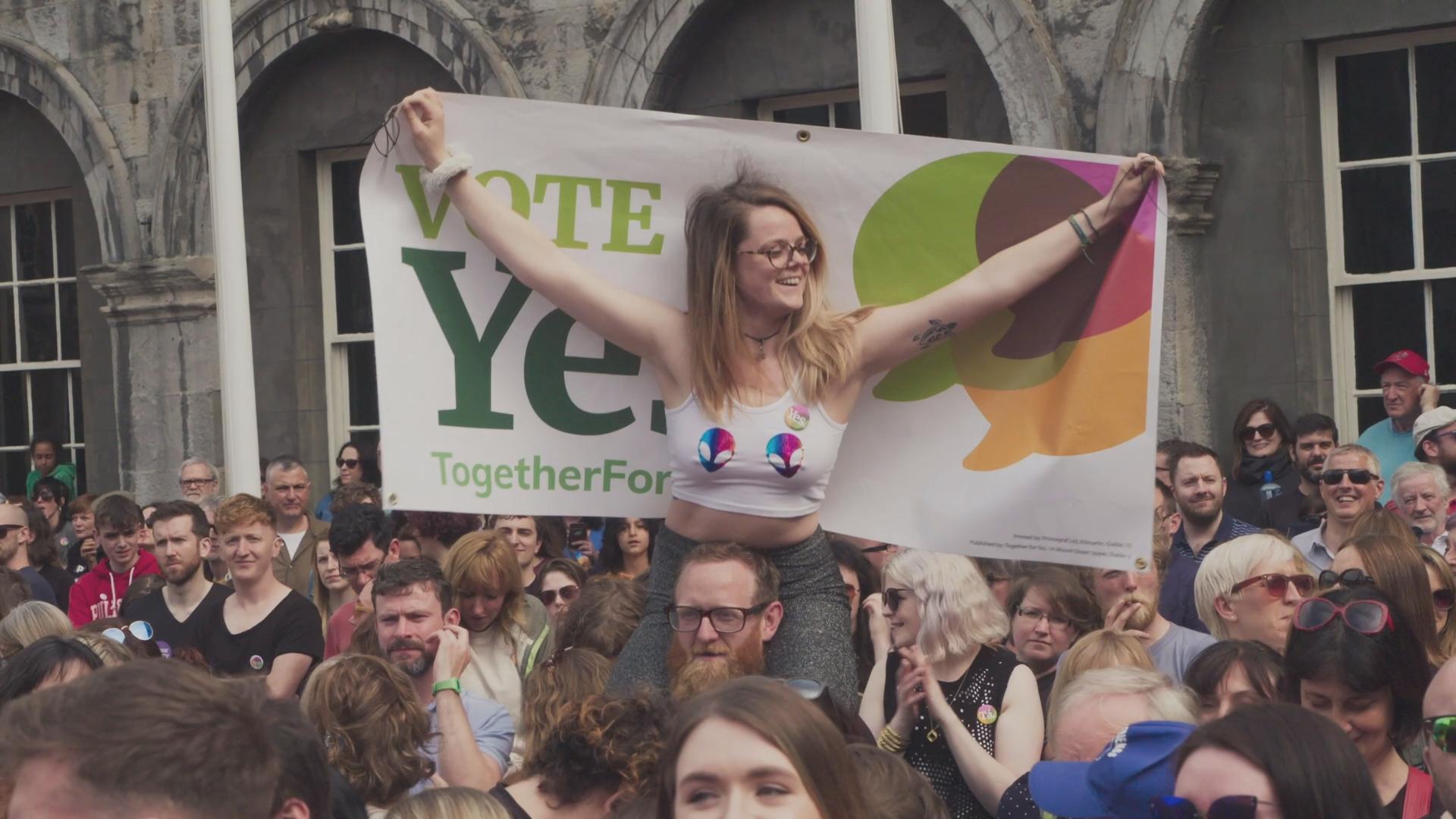
Note: This film contains flickering or flashing lights that may affect those with photosensitive epilepsy.
Directed, fittingly, by not one but three filmmakers (Aideen Kane, Lucy Kennedy, Maeve O’Boyle), The 8th documents the collective efforts of women’s rights activists to repeal a longstanding ban on abortion in Ireland. Although referred to at one point in the film as a “young people’s movement,” reproductive rights have been a contested terrain in that predominately Catholic country for decades, and the hard-won reforms of recent years were made possible thanks to earlier generations’ unflagging commitment to feminist causes. As the founding director of Women’s Education, Resource and Research Centre in Dublin, the eternally youthful Ailbhe Smyth has long been at the forefront of that movement and shows no signs of slowing down her attempt to abolish the 8th Amendment, which was added to Ireland’s Constitution in 1983 after a controversial referendum had received majority approval from voters and legislators. Since that time, public opinion has shifted and numerous cases — including those in which teenage girls were forced to look outside the country for safe and legal options after being impregnated by rapists — have revealed the misogynistic underpinnings of a culture that still looks upon women as second-class citizens (who, in the words of Smyth, have been “institutionally corralled” by a patriarchal system since birth). Kane, Kennedy, and O’Boyle’s bracing look at what one onscreen commentator refers to as “the most divisive issue in Ireland ever” gives both sides of the debate — including pro-life campaigners seeking to turn the adjective “unborn” into a noun — an opportunity to explain their positions. But it justifiably champions those who marched in support of the repeal in 2017 and who continue to fight for the right to control their own bodies. Combining television news reports, footage of Parliamentary Committee hearings, archival documents related to the Magdalene laundries (which housed “fallen women” throughout the twentieth century), and present-day interviews with everyone from nail salon owner Andrea Horan to politician Deirdre Duffy and radio journalist Wendy Grace, this historically wide-ranging yet laser-focused film cuts through the noise of conflict to show a nation unified by claims of compassion and a call for change. Ultimately, The 8th is a film by women about women but for anyone who would stand alongside the many protestors that, in the lead-up to the 2018 vote, chanted the commonsense slogan “Not the Church, Not the State, Women Must Decide Their Fate.”
David Scott Diffrient
Film ticket includes access to an exclusive prerecorded interview with co-director Aideen Kane moderated by CSU's Kevin Foskin.
Click HERE for opportunities to engage with the film through discussion and action, including a list of our affiliate organizations, discussion guide, and resources to learn more
- Year2020
- Runtime94 minutes
- LanguageEnglish
- CountryIreland
- DirectorAideen Kane, Lucy Kennedy, Maeve O’Boyle
Note: This film contains flickering or flashing lights that may affect those with photosensitive epilepsy.
Directed, fittingly, by not one but three filmmakers (Aideen Kane, Lucy Kennedy, Maeve O’Boyle), The 8th documents the collective efforts of women’s rights activists to repeal a longstanding ban on abortion in Ireland. Although referred to at one point in the film as a “young people’s movement,” reproductive rights have been a contested terrain in that predominately Catholic country for decades, and the hard-won reforms of recent years were made possible thanks to earlier generations’ unflagging commitment to feminist causes. As the founding director of Women’s Education, Resource and Research Centre in Dublin, the eternally youthful Ailbhe Smyth has long been at the forefront of that movement and shows no signs of slowing down her attempt to abolish the 8th Amendment, which was added to Ireland’s Constitution in 1983 after a controversial referendum had received majority approval from voters and legislators. Since that time, public opinion has shifted and numerous cases — including those in which teenage girls were forced to look outside the country for safe and legal options after being impregnated by rapists — have revealed the misogynistic underpinnings of a culture that still looks upon women as second-class citizens (who, in the words of Smyth, have been “institutionally corralled” by a patriarchal system since birth). Kane, Kennedy, and O’Boyle’s bracing look at what one onscreen commentator refers to as “the most divisive issue in Ireland ever” gives both sides of the debate — including pro-life campaigners seeking to turn the adjective “unborn” into a noun — an opportunity to explain their positions. But it justifiably champions those who marched in support of the repeal in 2017 and who continue to fight for the right to control their own bodies. Combining television news reports, footage of Parliamentary Committee hearings, archival documents related to the Magdalene laundries (which housed “fallen women” throughout the twentieth century), and present-day interviews with everyone from nail salon owner Andrea Horan to politician Deirdre Duffy and radio journalist Wendy Grace, this historically wide-ranging yet laser-focused film cuts through the noise of conflict to show a nation unified by claims of compassion and a call for change. Ultimately, The 8th is a film by women about women but for anyone who would stand alongside the many protestors that, in the lead-up to the 2018 vote, chanted the commonsense slogan “Not the Church, Not the State, Women Must Decide Their Fate.”
David Scott Diffrient
Film ticket includes access to an exclusive prerecorded interview with co-director Aideen Kane moderated by CSU's Kevin Foskin.
Click HERE for opportunities to engage with the film through discussion and action, including a list of our affiliate organizations, discussion guide, and resources to learn more
- Year2020
- Runtime94 minutes
- LanguageEnglish
- CountryIreland
- DirectorAideen Kane, Lucy Kennedy, Maeve O’Boyle

